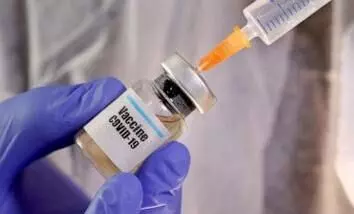
Covid Vaccine by Oxford likely By April 2021, ₹ 1,000 For 2 Doses says, Adar Poonawalla
text_fieldsVaccine maker Serum Institute of India's CEO Adar Poonawalla on Thursday said the Oxford COVID-19 vaccine should be available for healthcare workers and elderly people by around February 2021 and by April for the public and will be priced at a maximum of ₹ 1,000 for two necessary doses for the public, depending on the final trial results and regulatory approvals.
Probably by 2024, every Indian will get vaccinated, he said at the Hindustan Times Leadership Summit (HTLS), 2020.
"It will probably take two or three years for every Indian to get inoculated, not just because of the supply constraints but because you need the budget, the vaccine, logistics, infrastructure and then, people should be willing to take the vaccine. So these are the factors that lead up to being able to vaccinate 80-90 per cent of the population.
"It will be 2024 for everybody, if willing to take a two-dose vaccine, to be vaccinated," Mr Poonawalla said.
Asked at what price the public will get it, he said it will be around USD 5-6 per dose with an MRP of around ₹ 1,000 for the two necessary doses.
"The government of India will be getting it at a far cheaper price at around USD 3-4, because it will be buying in a large volume and get access to the price that is similar to what COVAX has got. We are still pricing it far cheaper and more affordable than other vaccines we have in the market today," Mr Poonawalla said.
Asked about the efficacy of the vaccine, he said the Oxford-Astrazeneca vaccine is so far proving to work very well even in elderly people, which was a concern earlier.
"It has induced a good T-cell response, which is an indicator for your long-term immunity and antibody response but then again, time will only tell if these vaccines are going to protect you in the long term. Nobody can answer that for any of the vaccines today," Mr Poonawalla said.
Responding to a question on the safety aspect, he said there has been no major complaints, reactions or adverse events, adding, "We would need to wait and see. The efficacy and immunogenicity results from the Indian trials will come out in about a month-and-a half."
Asked when the SII will apply for an emergency authorisation, Mr Poonawalla said as soon as the UK authorities and the European Medicines Evaluation Agency (EMEA) approve it for emergency use, it will apply to the drug controller for emergency use authorisation in India.
"But that will be for a limited use for frontline workers, healthcare workers and elderly people," he added.
Children would have to wait a little longer till the safety data is out, but the good news is that COVID-19 is not so bad and serious for them, Mr Poonawalla said.
"Unlike measles pneumonia, which is deadly, this disease is seeming to be less of a nuisance for children but then, they can be carriers and can give the infection to others.
"We want to vaccinate the elderly people and others who are the most vulnerable first. Once we have enough safety data to go in on children, we can recommend it for children too," he said.
Mr Poonawalla said the Oxford vaccine is affordable, safe and stored at a temperature of two to eight degrees Celsius, which is an ideal temperature for it to be stored in the cold storages of India. He said the SII plans to make about 10 crore doses per month from February.
As regards how many doses would be provided to India, Mr Poonawalla said talks are still going on and no agreement has been arrived at in this regard.
"India wants around 400 million doses by July. I do not know if it will take all from the Serum Institute. We are gearing up to offer that kind of volume to India and still have a few 100 million to offer to COVAX by July and August. No agreement so far," he said.
Mr Poonawalla said the SII is not agreeing with other countries at this moment as India is its priority.
"We have not signed and committed anything else beyond Bangladesh at the moment. We really do not want to partner right now with many countries because we will not have enough stocks to deliver.
"We want to handle India as a priority first and manage Africa at the same time and then help out other countries," he said.
Mr Poonawalla said 30-40 crore doses of the Oxford vaccine will be available by the first quarter of 2021.
In another session of the summit, AIIMS Director Dr Randeep Guleria said there is some talk going on between Pfizer and the Indian government, but not much with Moderna.
"It is going to be a huge challenge as far as the Pfizer vaccine is concerned, considering that it needs a cold chain of minus 70 degrees Celsius," he said and pinned hoped on the vaccines that are at various stages of trial in India.
On the availability of a COVID-19 vaccine, Dr Guleria said the percentage of the population to be inoculated will depend on the number of vaccines getting the regulatory approvals and the number of shots they are producing.
He further said the coronavirus goes into the lungs without making a person symptomatic.
"We have individuals who are asymptomatic and you can see patches in their lungs at CT scans directly. It really bypasses a person's defence mechanism, which means that you not only have the virus in your nose or throat, but it has gone right into your lungs. A virus which can do that is something we have to be wary of," Dr Guleria said.























